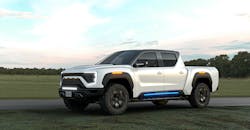Under a new non-binding Memorandum of Understanding (MoU) between Nikola Corp. and General Motors signed today, the two companies are altering the scope of their previous strategic partnership announced on Sept. 8. Two days after the previous deal was signed, a damaging report surfaced alleging Nikola of fraud and the partnership has been in question ever since.
Under the MoU’s terms, the focus will be squarely on integrating GM’s Hydrotec fuel cells into Nikola’s Class 7 and 8 trucks. If the new plan is realized, GM and Nikola will mutually agree on the fuel cell system specifications and Nikola will pay for any capacity capital investments upfront. Originally, GM was to receive an 11% stake in Nikola for its overall contributions. This included GM supplying Hydrotec fuel cells and Ultium batteries for Nikola’s battery-electric trucks, as well as system and chassis validation. Discussions will continue on whether Nikola trucks will use GM’s battery powertrain.
"This supply agreement recognizes our leading fuel cell technology expertise and development," said Doug Parks, GM executive vice president of Global Product Development, Purchasing and Supply Chain. "Providing our Hydrotec fuel cell systems to the heavy-duty class of commercial vehicles is an important part of our growth strategy and reinforces our commitment toward an all-electric, zero-emissions future."
Nikola said production-engineered prototypes of its hydrogen-powered trucks will roll out in late 2021 with beta testing to commence in 2022. Production on the Nikola Tre battery-electric truck in Germany in conjunction with IVECO is also planned for late 2021.
“We are excited to take this important step with GM, which provides an opportunity to leverage the resources, strengths and talent of both companies,” Nikola CEO Mark Russell said. “Heavy trucks remain our core business and we are 100% focused on hitting our development milestones to bring clean hydrogen and battery-electric commercial trucks to market. We believe fuel cells will become increasingly important to the semi-truck market, as they are more efficient than gas or diesel and are lightweight compared to batteries for long hauls. By working with GM, we are reinforcing our companies’ shared commitment to a zero-emission future.”
Badger buried
There has been one significant casualty: the Nikola Badger. The zero-emission pickup truck, which would be available with either powertrain options, will no longer be included in the deal and its development has been halted. Production was dependent on Nikola finding an OEM partner.
“The Badger is done for now and we are refunding all customer deposits,” a Nikola spokesperson told FleetOwner via email. “Nikola is bringing its focus back to its core business — commercial trucks — and working to meet its milestones.”
When the Badger was revealed in February, it looked like it could revolutionize the light-duty truck market by providing a fuel cell option that could match up against a Ford F-150 Raptor. With GM’s involvement, the pickup’s performance was poised to get even better, with horsepower increased by 9% and towing capacity by 25%.
The initial agreement had to be reworked as investor confidence in Nikola was decimated a few days after it was announced. That’s when Hindenburg Research released a damaging report accusing Nikola founder Trevor Milton of fraud and subterfuge. That shook investor confidence, as stock prices fell from $50 on Sept. 8 to a low of under $18 on Sept. 29. Stock prices climbed back to $34.50 on Nov. 24, though the recent announcement has driven shares under $21 again.
About the Author
John Hitch
Senior Editor
John Hitch writes about the latest manufacturing trends and emerging technologies, including but not limited to: Robotics, the Industrial Internet of Things, 3D Printing, and Artificial Intelligence. He is a veteran of the United States Navy and former magazine freelancer based in Cleveland, Ohio.
Questions or comments may be directed to: [email protected]
